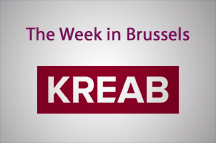 If we start the week on Sunday, many in Brussels breathed a rather deep sigh of relief as Germany received a green light from the SPD to form a grand coalition with the CDU/CSU. Without this, there would have continued a political vacuum in the largest and most powerful economy in Europe, and progress on many EU policies might have stalled. The mood, however, was tempered by the fact that elections in Italy, that also took place on 4 March, have resulted in a hung parliament. Although this was widely predicted, it is troublesome to European leaders that a populist anti-establishment and Euro-skeptical party received the largest share, a third, of the votes in the EU’s fourth largest economy, and a founding member to boot.
If we start the week on Sunday, many in Brussels breathed a rather deep sigh of relief as Germany received a green light from the SPD to form a grand coalition with the CDU/CSU. Without this, there would have continued a political vacuum in the largest and most powerful economy in Europe, and progress on many EU policies might have stalled. The mood, however, was tempered by the fact that elections in Italy, that also took place on 4 March, have resulted in a hung parliament. Although this was widely predicted, it is troublesome to European leaders that a populist anti-establishment and Euro-skeptical party received the largest share, a third, of the votes in the EU’s fourth largest economy, and a founding member to boot.
Such events serve as an important reminder for those who are preoccupied with Brexit, that it is not always top of the agenda in Brussels, or for that matter in most of the capitals in the EU27. And there are several other internal and external challenges that concern policy makers in the European institutions and member states. Another one reared its ugly head this week, from across the Pond. The US plans to impose a global tariff on steel and aluminium imports under Section 232 and based on claims that imports pose a threat to “national security”. The US President said he would impose tariffs in “a loving way”, but the EU was not much reassured by this.

The looming threat of a trade war with the United States jeopardizes thousands of European jobs in economically vulnerable areas. On Wednesday, the College of Commissioners discussed the measures that the Commission plans to roll out in response to the US import restrictions, once the US formally imposes the announced measures. Trade Commissioner Cecilia Malmström outlined three courses of action that the EU is ready to take. The response would be firm but proportionate, and “by the WTO rule book”.
WTO Dispute Settlement Proceedings:
The EU is prepared to defend its rights as a WTO member and invoke the organisation’s dispute settlement proceedings. It will coordinate a potential legal complaint against the US with other affected trading partners and believes it has a strong case. Malmström expressed strong doubts that the US can make a politically and legally justifiable case, based on national security arguments, that tariffs would be compatible with WTO law. According to the Commission, this justification is weak, as it also concerns imports from strong allies such as the EU. Legal actions at the WTO can take a long time to bear fruit so other actions are planned.
Safeguard measures on third country imports of steel and aluminium into the EU to counter possible trade diversion:
US measures are expected to divert around 15 million tons of trade away from the US. The European Commission is undertaking preparatory work to impose its own safeguard measures on imports of steel and aluminium entering the EU from third countries. The aim of such measures would be to protect EU steel and aluminium producers from suffering economic injury from a sudden influx of non-EU steel and aluminium goods. Safeguard measures could take the form of import tariffs or quotas. The Commission will have to complete an investigation before officially imposing such measures, and this process could take up to two months.
Rebalancing/compensatory EU tariffs on a list of US products:
The Commission believes that the US measures are not “national security” related but, according to Malmström, an “economic safeguard in disguise”. Consequently, it contends it has the right under WTO GATT and Safeguard Agreements to apply “rebalancing” tariffs that would compensate for the losses that the EU is expected to suffer due to the US measures. The Commission has drafted a provisional list of products that should be targeted for such retaliatory measures. The list may include a mix of industrial products, agricultural products and steel products. The EU will notify the measures to the WTO and its members under a procedure that could take up to 90 days. To avoid disruption of EU supply, the Commission will make sure that alternative supplies are available for the products listed.
European Council President Donald Tusk has placed an extraordinary debate on the matter on the agenda of the next European Council on 22-23 March. This is also when the Council is due to approve its Guidelines on the framework for the future relationship with the UK.
So those will be busy days.














